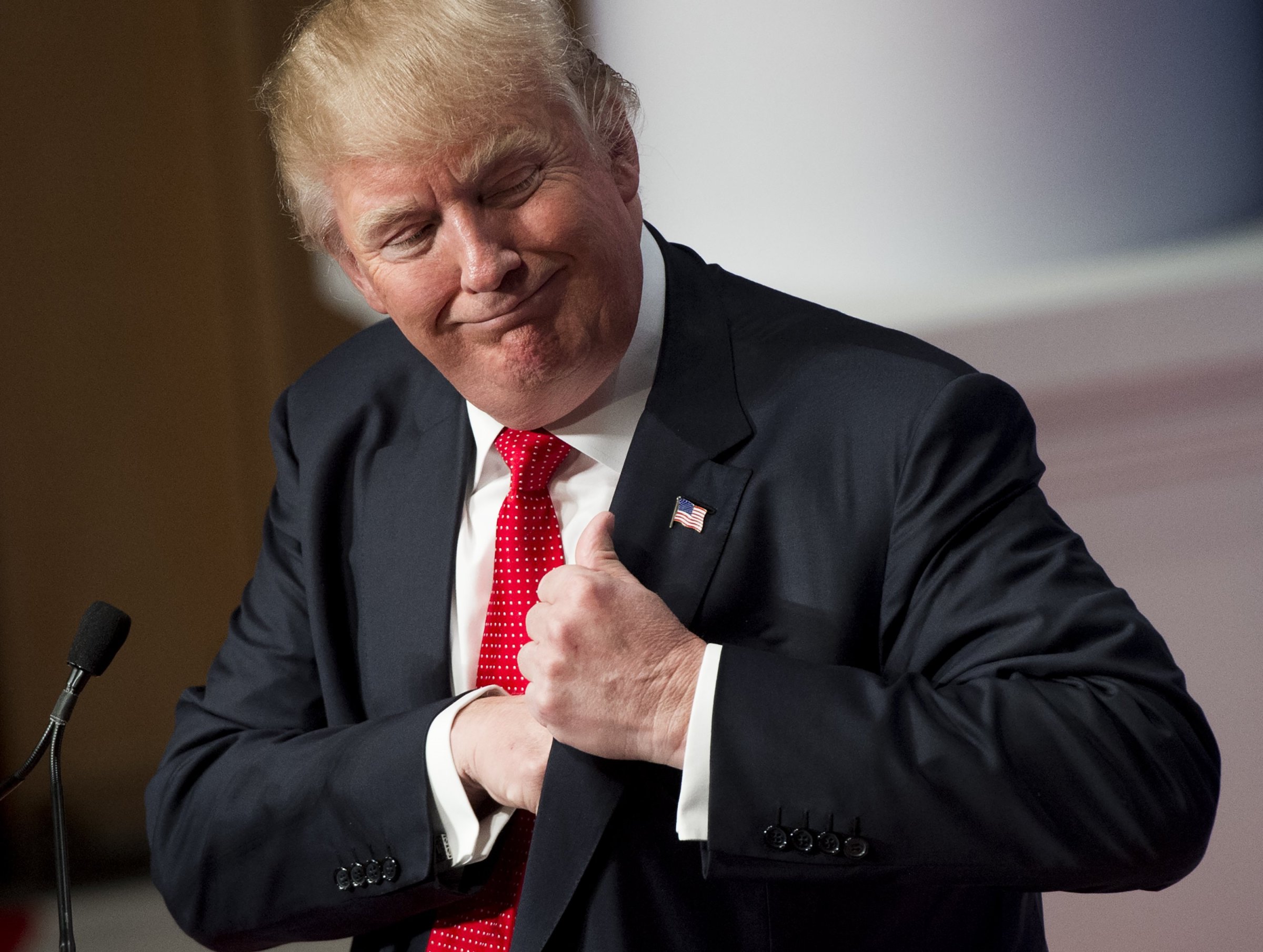
You may have noticed this before, but moderation has never exactly suited Donald Trump. There are ordinary buildings and there are the mirrored confections that are Trump buildings. There are presidential bandwagons and there is the horn-blaring, traffic-clearing Trump bandwagon. There is, too, ordinary narcissism and then there is Trumpian narcissism.
Well before Trump ever declared for the presidency, he was already the exemplar of the narcissistic form. The strutting, blustering, arm-waving dance of the narcissist were all there. So too were the intolerance of criticism, the self-aggrandizing claims, the look-at-me hair and the envy-me wives. His campaign has merely turbo-charged all that.
But while Trump’s narcissism seems self-evident—even if, as far as we know, no doctor has ever formally diagnosed or treated him—it’s a particularly complex case of the disorder. I spent a lot of time in the mirror-world of the narcissist when I was writing my 2014 book, The Narcissist Next Door, and most of the experts I spoke to and studies I read define the condition as a sort of toxic mash-up of grandiosity, entitlement and lack of empathy. Trump checks those boxes almost every day—most recently and disturbingly the lack of empathy one. You don’t mock the appearance of a reporter who has a conspicuous disability if you give a fig about how the target of your ridicule will feel about your behavior.
But from the beginning of his campaign, Trump has been an atypical narcissist too. Most narcissists, especially ones who have achieved as much fame and wealth as Trump has, are exceedingly good at what’s known as the emergent—or beginning—phase of any enterprise. There’s a charm, a charisma, an articulate energy that draws people in. Think John Edwards in the early stages of his brief and eventually disastrous political career. Think of every boss you’ve ever had who dazzled and energized the entire staff in the first six months on the job, only to turn into a boor and a bully later.
But Trump, strangely, has skipped over that honeymoon phase. And stranger still, his followers don’t seem to mind—as a new poll that finds him the favorite of 36% of Republican voters, his best numbers yet, shows. He does not charm. He does not dazzle. He does not soothe like a Ronald Reagan or seduce like a Bill Clinton.
His language is hamstrung by his over-reliance on simplistic superlatives—huge, the greatest, the best. He slips into both innuendo—as when he talked of blood coming out of Megyn Kelly’s “wherever”—and the clumsy talk of a bad seducer, as when he recently told a heckler, “Just relax. You’ll like me very much, believe me.” Even his gestures are limited, mostly to a stiff sort of half-clap, in which he brings his hands back and forth as if to applaud but never actually gets there. These are not the subtle semiotics of a Clinton, for whom pointing a straight index finger indicated one thing and a slightly bent one something else.
Trump’s lack of either ability or willingness to provide an answer when he is asked for specifics about his proposals (“We’re going to be looking into all these things”) also runs counter to the common grain of narcissism. In a just-released study, psychological scientist William von Hippel of Australia’s University of Queensland recruited a sample group 417 volunteers and surveyed their friends and family members, asking how charismatic, funny and quick-witted they were—all of which are qualities the emergent narcissist exhibits in abundance. Von Hippel then had the 417 subjects themselves take two tests: one asked them to answer 30 common knowledge questions, such as “Name a precious gem.” The other had them indicate the location of a dot or identify a pattern on a screen.
In both cases, he graded the subjects less on accuracy than on speed. And in all cases, the people who scored highest on swiftness of thought also scored highest on the three personality metrics. Whatever else Trump’s supporters might like about him, charisma, humor and sharp improvisational thinking are not part of the list.
None of this means Trump isn’t a narcissist. The condition is practically the table stakes for anyone who considers running for president in the first place. Some studies—most famously one by psychologist Ronald Deluga of Bryant University in Rhode Island—have even used historical data and psychological diagnostic tools to rank all of the presidents on a narcissism scale. (The winner, in case you were wondering, scoring 35 on a scale of 0 to 40, was a dark horse: Chester A. Arthur, known in his time by the nickname “dude of the White House”—a nod to his wardrobe, which included 80 pairs of pants, and his habit of changing his clothes three times a day.)
Trump, like some of America’s less charming presidents—Richard Nixon, Calvin Coolidge—brings all of the bad to the narcissism game and little of the good, though Coolidge and Nixon were at least known for an intellectual nimbleness, and Coolidge was known for an extreme reserve, both of which Trump clearly lacks. Those very shortcomings, however, are a big part of Trump’s success so far. He has always tried to appeal less to hope than to grievance, less to joy than to rage. That, history has shown, can indeed be a route to winning high office—even if it’s also a route to doing very bad things once you get there.
Read Next: Donald Trump Has Landed
More Must-Reads From TIME
- The 100 Most Influential People of 2024
- Coco Gauff Is Playing for Herself Now
- Scenes From Pro-Palestinian Encampments Across U.S. Universities
- 6 Compliments That Land Every Time
- If You're Dating Right Now , You're Brave: Column
- The AI That Could Heal a Divided Internet
- Fallout Is a Brilliant Model for the Future of Video Game Adaptations
- Want Weekly Recs on What to Watch, Read, and More? Sign Up for Worth Your Time
Write to Jeffrey Kluger at jeffrey.kluger@time.com